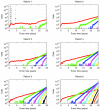Accumulation of driver and passenger mutations during tumor progression
- PMID: 20876136
- PMCID: PMC2972991
- DOI: 10.1073/pnas.1010978107
Accumulation of driver and passenger mutations during tumor progression
Abstract
Major efforts to sequence cancer genomes are now occurring throughout the world. Though the emerging data from these studies are illuminating, their reconciliation with epidemiologic and clinical observations poses a major challenge. In the current study, we provide a mathematical model that begins to address this challenge. We model tumors as a discrete time branching process that starts with a single driver mutation and proceeds as each new driver mutation leads to a slightly increased rate of clonal expansion. Using the model, we observe tremendous variation in the rate of tumor development-providing an understanding of the heterogeneity in tumor sizes and development times that have been observed by epidemiologists and clinicians. Furthermore, the model provides a simple formula for the number of driver mutations as a function of the total number of mutations in the tumor. Finally, when applied to recent experimental data, the model allows us to calculate the actual selective advantage provided by typical somatic mutations in human tumors in situ. This selective advantage is surprisingly small--0.004 ± 0.0004--and has major implications for experimental cancer research.
Conflict of interest statement
The authors declare no conflict of interest.
Figures




Comment in
-
Population genetics meets cancer genomics.Proc Natl Acad Sci U S A. 2010 Oct 26;107(43):18241-2. doi: 10.1073/pnas.1013177107. Epub 2010 Oct 8. Proc Natl Acad Sci U S A. 2010. PMID: 20935251 Free PMC article. No abstract available.
References
Publication types
MeSH terms
Grants and funding
LinkOut - more resources
Full Text Sources
Other Literature Sources

